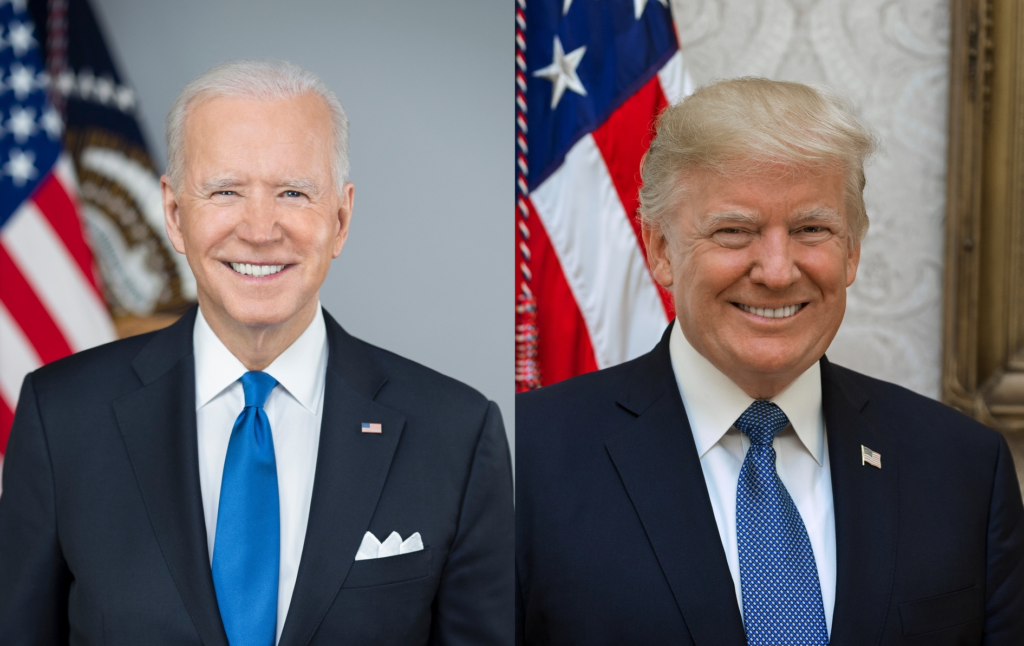OP-ED: Arab and Muslim Americans Could Determine Who the Next President of the United States Will Be: Biden or Trump

By: Bishara A Bahbah / Arab America Contributing Writer
The Arab and Muslim American votes in the swing states of Michigan and Arizona could hold the key to the U.S. presidency this November. Their support could make the difference between a Joe Biden presidency and a Donald Trump presidency, underlining the potential influence of this specific demographic.
National Republican Chair Michael Chatley has underscored Michigan’s significance. At a recent event in one of Detroit’s suburbs, in which I was present, he stated, “If we [Republicans] don’t carry Michigan, we will not win the presidency.”
Six pivotal swing states—collectively holding the critical 77 electoral votes out of 270 needed to win the presidency—will decide the fate of the next president of the United States.
The Washington Post recently highlighted the enigma of swing state voters, stating, “Barring a major shift in the political winds, the 2024 election will be decided by a subset of voters in a handful of swing states whose behavior is hard to predict.”
Michigan’s votes, which propelled Donald Trump into the presidency by less than 11,000 votes in 2016 and handed the presidency to Joe Biden in 2020 by about 155,000 votes, today hold more weight than any financial contribution to either candidate, making this election a unique event in American history. Votes matter more than money. Voting for either candidate, particularly in Michigan, will be more valuable than donations of money, especially from pro-Israel groups.
All but one of the national polls dating back to June 10 show that Donald Trump is the favorite among registered voters. However, examining where the swing states stand is more critical as they historically determine who the next president will be. In 2020, Joe Biden won all six swing states: Arizona, Georgia, Michigan, Nevada, Pennsylvania, and Wisconsin. He needs to win at least five of those states in November to win the presidency.
Unfortunately for Biden, during this election cycle, the New York Times aggregate poll tracking indicates that Trump holds a lead of 3-4 points in Georgia, Nevada, and Arizona. In Pennsylvania and Michigan, Trump holds a lead of 2 points, while in Wisconsin, Trump holds the lead by 1 point. To win the presidency, Trump can afford to lose Wisconsin with its ten electoral votes; however, he cannot afford to lose Michigan with its 15 electoral votes.
Herein lies the centrality of Arab and Muslim American votes in November.
Trump is aware of the significance of these votes. That is why he tasked his Lebanese American son-in-law, Michael Boulos, his father, Dr. Massad Boulos, and his top foreign policy advisor, Ambassador Richard Grenell, to go to Michigan in May and, again, in June. As national chair of Arab Americans for Trump, I was heavily involved in organizing meetings between Arab and Muslim American community leaders from all over the United States and this high-level delegation that Trump sent. This channel is separate and unrelated to Trump’s formal election campaign.
Arab and Muslim Americans are furious at the unfettered military and political support that President Biden has provided to Israel following Hamas’ attacks on Israel on October 7. The disproportionate Israeli military onslaught on Gaza and the excessively high casualty numbers among its civilian population enraged our communities in the United States. Biden has lost the Arab and Muslim American votes for good.
According to a recent poll by Zogby Strategies commissioned by the Arab American Institute, 79% of Arab Americans have an unfavorable view of Biden. Ambassador Grenell and Dr. Massad Boulos argued during the meetings with Arab and Muslim American leaders that if they rally behind Trump at an early stage of the voting cycle, especially in the swing states of Arizona and Michigan, they will then have a seat at the table and a voice to be heard.
Community leaders wanted clarification of the now-defunct so-called “Muslim ban.” Grenell indicated there was no Muslim ban and that Trump was talking about the heightened vetting of individuals coming into the United States from countries with internal strife. Notwithstanding this explanation, community leaders wanted reassurances from Trump regarding this issue before they threw their support behind him.
The organization that I founded and led, “Arab Americans for Trump,” has been keen to point out to Arab and Muslim American leaders that an “uncommitted” vote or a vote for third-party candidates are effectively “feel-good” yet “wasted” votes with nowhere to go to collect their political dividends. Hence, early support for Trump is the only choice that our community has.
Perhaps in response to our meetings with Trump’s envoys, on June 4, former President Trump posted on his social media platform a statement that noted that President Biden’s June ceasefire proposal was intended to “fix the DISASTER he created in the Middle East because he’s afraid of losing the election.” We have viewed this statement as an affirmation that Biden and Trump have their eyes set on the election, particularly on the Arab and Muslim American votes to win the presidency.
In the statement, Trump wrote that during his presidency, there would be “NO MORE WARS… NO MORE CIVILIANS DYING.” We viewed this as a call to end the war in Gaza and put an end to the civilians dying in both Gaza and Israel.
Trump added, “I will fix his mess, and bring Peace to ALL Parties once again, and we’ll get it done FAST!” We view bringing peace to “all parties” as indicating that Palestinians will also enjoy peace.
Many in the community viewed Trump’s messages posted on June 4th convoluted. Community leaders pushed back on our request to have them support Trump immediately, noting Trump’s track record of supporting Israel during his presidency. The community is insisting on an unequivocal statement from Trump that he would support an immediate ceasefire in Gaza that would lead to reconstruction of Gaza and the West Bank and a commitment to pursue a peace process that would be based on the principle of a two-state solution with Palestine created on lands occupied by Israel during the June 1967 war.
Democrats readily offer the two-state solution proposal, yet they lavishly provide Israel with arms daily that end up killing Palestinians in Gaza. Arab and Muslim Americans view Biden’s offer as insincere and repulsive, given his complicity in the crimes committed against Palestinian civilians in Gaza.
Faced with a choice between two imperfect candidates, it appears that the Arab and Muslim communities in the United States will end up supporting a Trump presidency. We will get nothing in return if Trump wins without explicit and early support. If we offer our active support after receiving further reassurances, then for the first time, our communities will be a go-to address for generations to come among presidential candidates.
Bishara A. Bahbah is the national chairman of “Arab Americans for Trump.” He formerly taught at Harvard University and was the associate director of its Middle East Institute.
The views and opinions expressed in this article are those of the author and do not necessarily reflect the position of Arab America. The reproduction of this article is permissible with proper credit to Arab America and the author.
Check out our Blog here!








